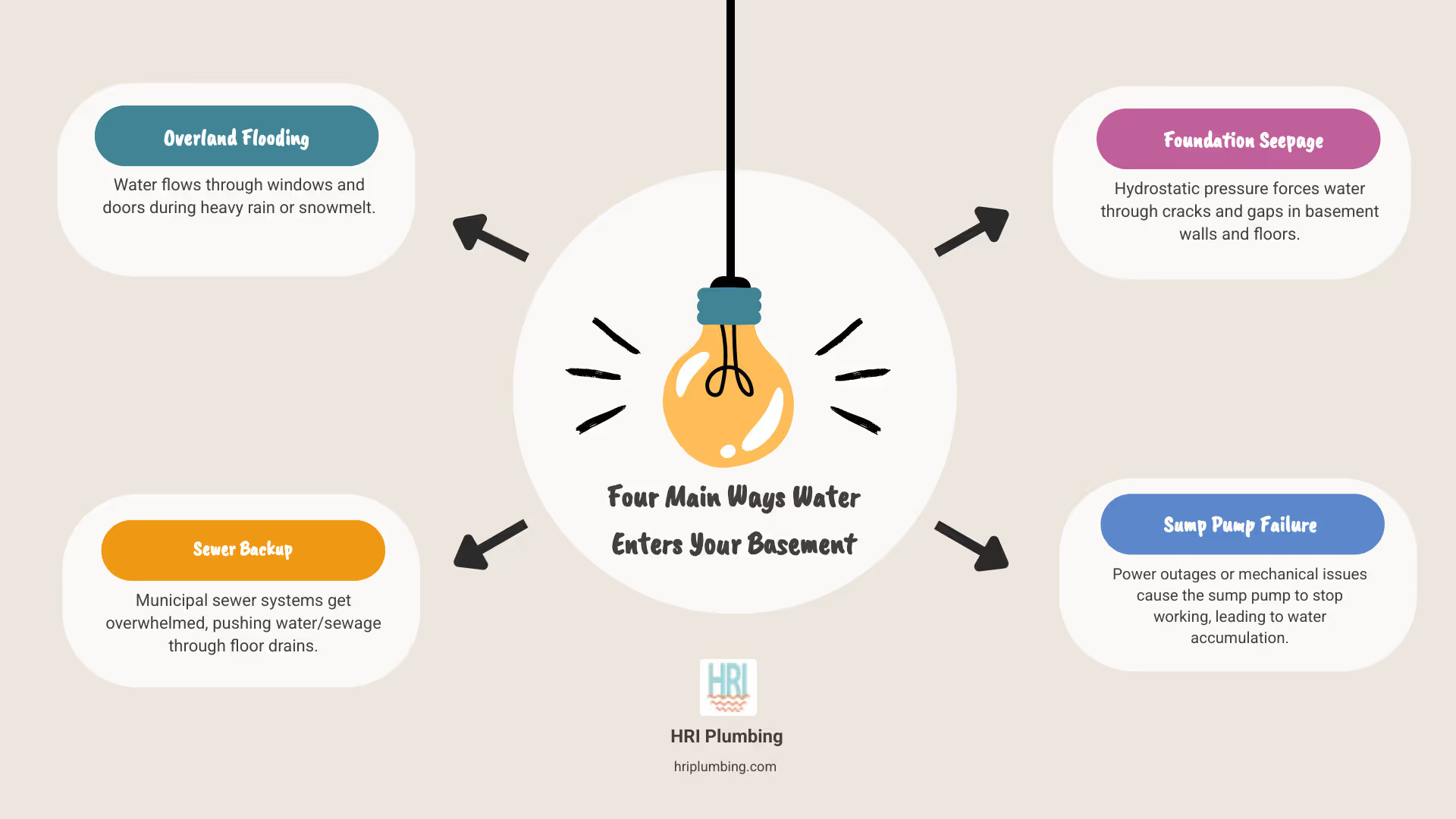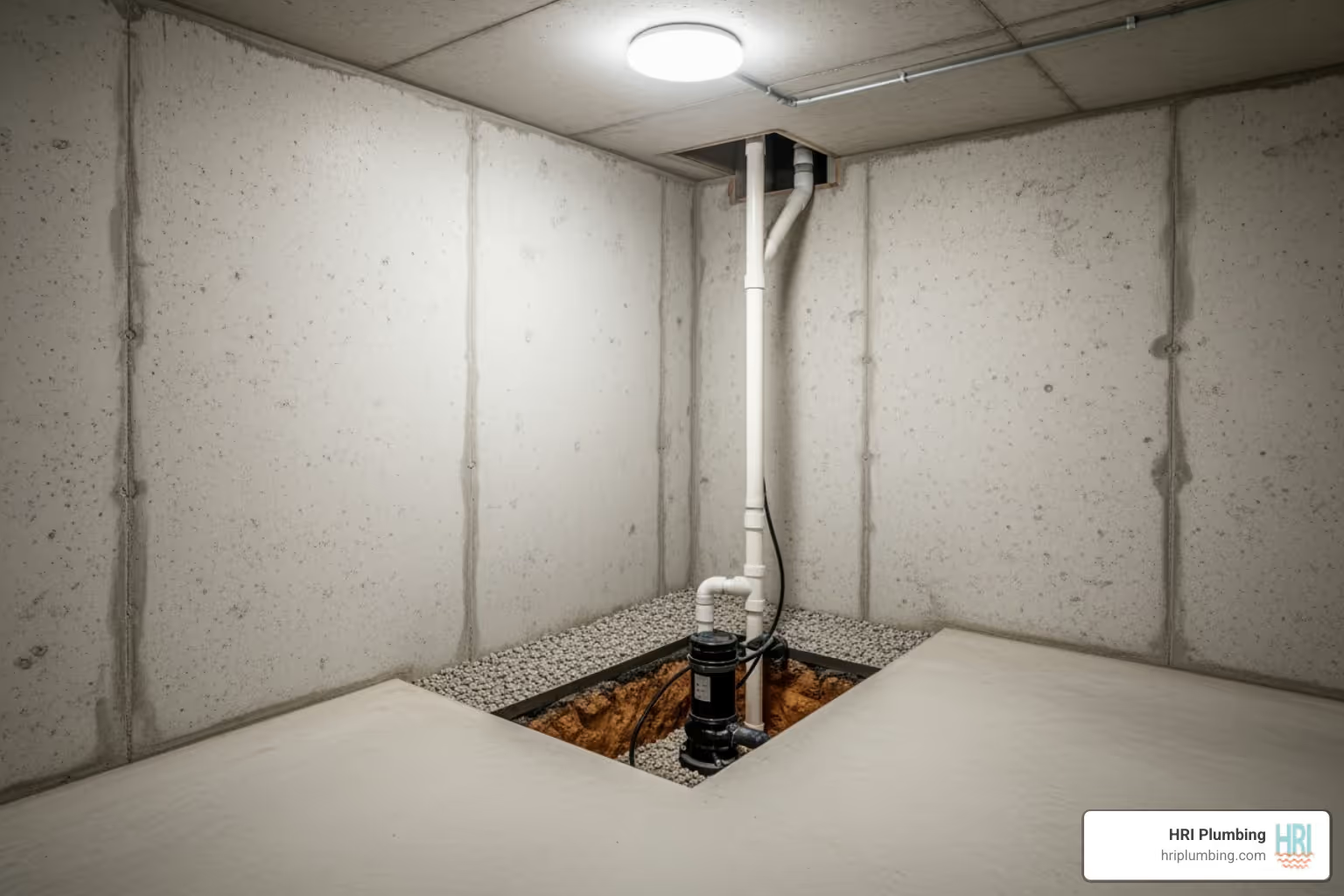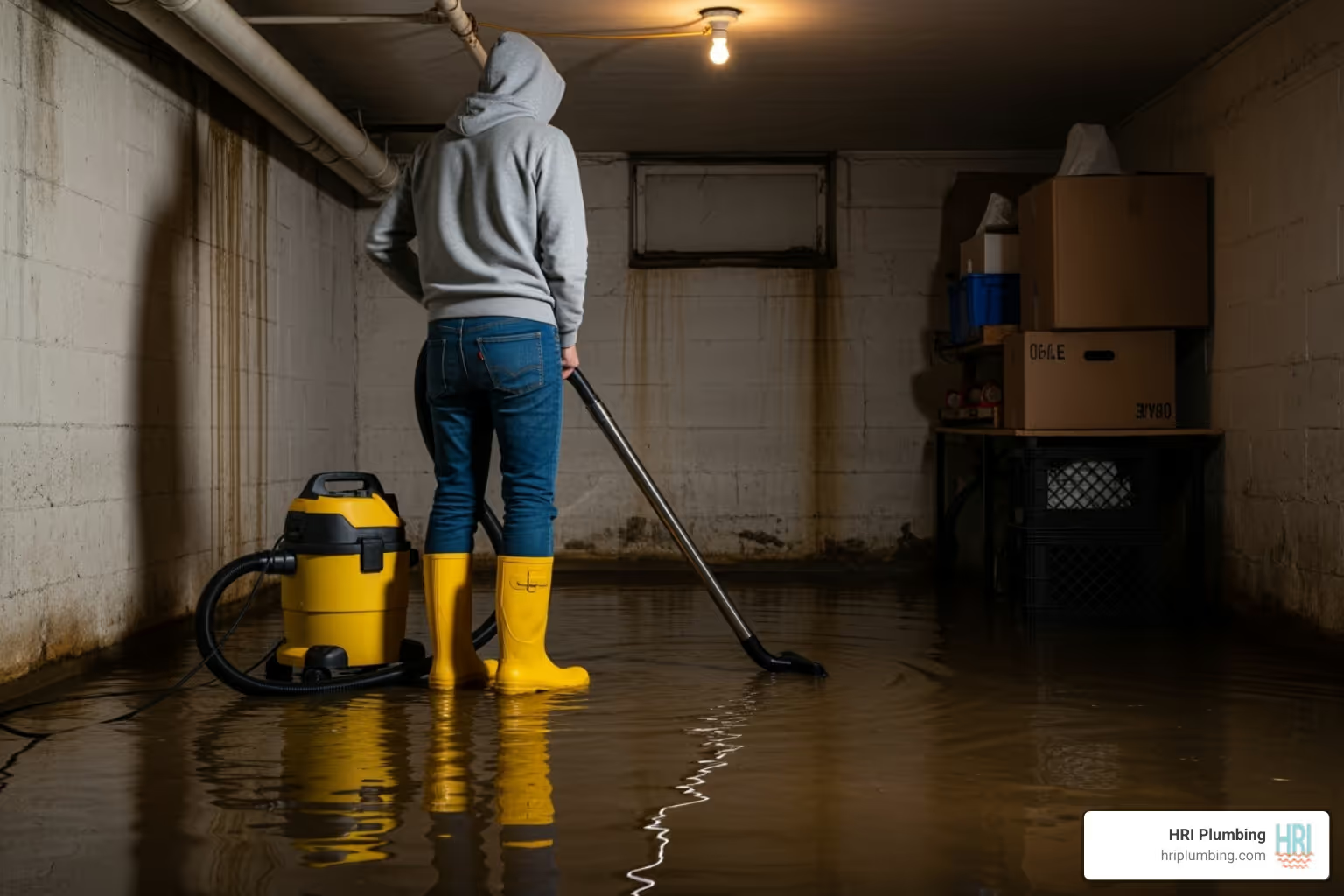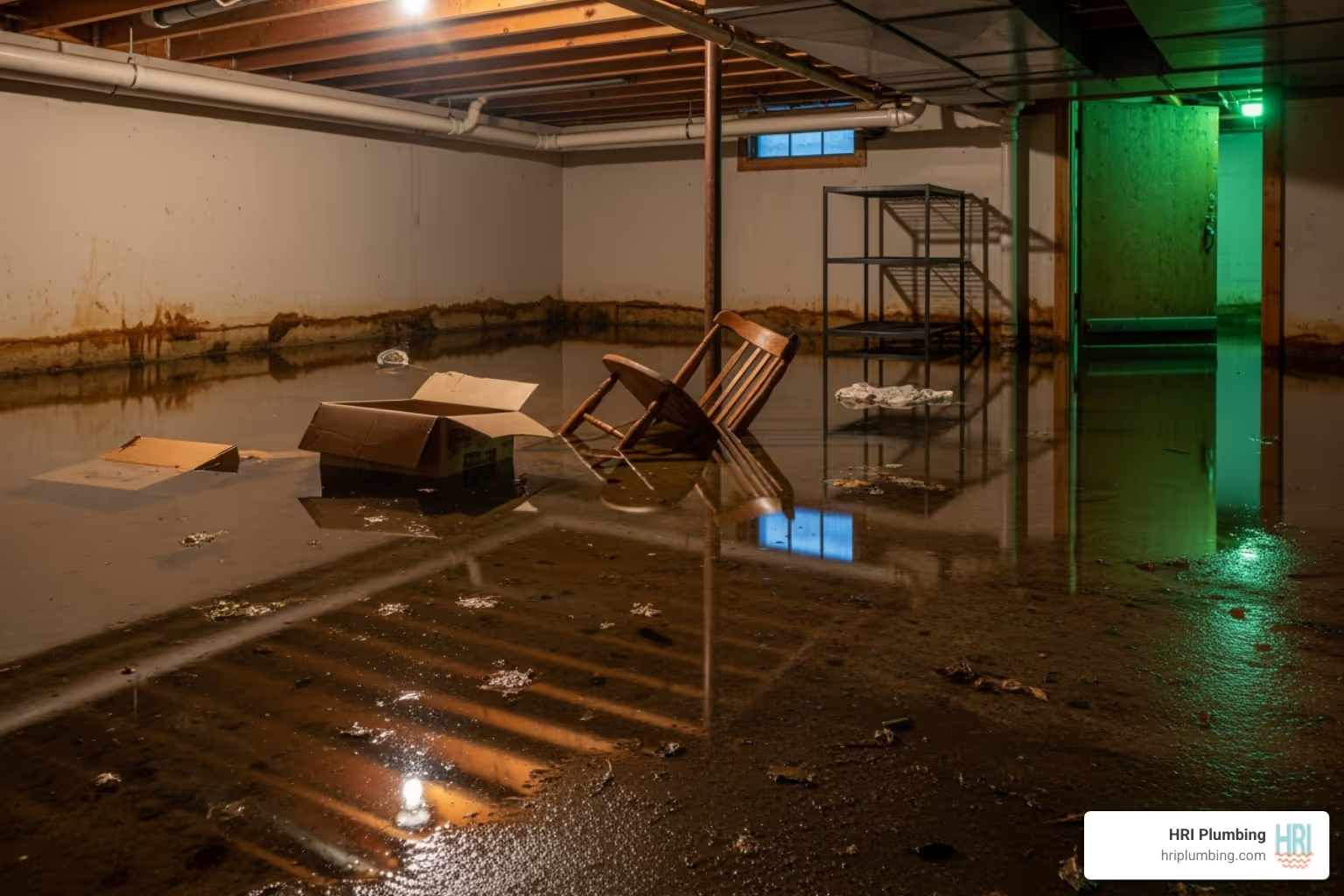Why Basement Flooding Prevention Matters More Than You Think
Finding the right basement flooding solution can save you thousands of dollars and countless sleepless nights. Here are the most effective ways to protect your basement from water damage:
Quick Basement Flooding Solutions:
- Install a sump pump with battery backup for groundwater protection
- Clean gutters and extend downspouts at least 10 feet from your foundation
- Grade your lawn to slope away from your home (6 inches per 10 feet)
- Seal foundation cracks with hydraulic cement or epoxy
- Install a backwater valve to prevent sewer backup
- Maintain your plumbing and address leaks immediately
A flooded basement may be high on the list of a homeowner's worst nightmares - and the statistics back up this fear. Most homes will experience a basement flood before the mortgage is paid off, making prevention not just smart but essential.
If you live in a flood-prone area, your home faces a 26% chance of flooding over a 30-year mortgage—nearly three times higher than the risk of fire. What many homeowners don't realize is that flooding can happen anywhere, and one in four flood claims occur in low-to-moderate risk areas.
Whether it's from heavy rainfall, a failed sump pump, or sewage backup, basement flooding can strike without warning. The good news is that most basement flooding is preventable with the right combination of exterior drainage improvements and interior safeguards. Taking action now means you won't be frantically calling for emergency repairs while watching your belongings float around your basement.

Understanding the Enemy: What Causes Basement Flooding?
Understanding what causes basement flooding is the first step toward finding the right basement flooding solution. The primary culprits often work in combination.
Heavy rainfall can quickly lead to saturated soil around your home. When the ground can't absorb any more water, it creates immense hydrostatic pressure against your foundation. This force pushes water through even the smallest foundation cracks, joints, and porous spots in your concrete.
Problems can also start with your home's exterior. Clogged gutters that overflow or improper grading that slopes toward your house will pool water directly against your foundation, giving it ample opportunity to seep inside.
Sewer system backup is another major threat. During heavy rains, overwhelmed municipal sewer lines can force wastewater back up through your floor drains. This type of flooding is not only damaging but also a serious health hazard due to contamination.
Mechanical issues are also a common cause. Sump pump failure, whether from a power outage, a breakdown, or an old unit, leaves your basement defenseless against rising groundwater. Internally, leaky pipes or a burst water heater can cause a sudden flood with no warning.
Once you identify these potential threats, you can take targeted action to create a comprehensive defense strategy for your home.
Fortifying Your Home's Exterior

The best basement flooding solution starts outside. Your first line of defense is to keep water from reaching your foundation. Managing rainwater properly around your property can prevent most basement flooding before it begins.
Gutters and Downspouts: Your First Line of Defense
Your roof funnels a massive amount of water toward your foundation during a storm. Properly functioning gutters and downspouts are essential to manage this flow.
Gutter cleaning is crucial. Clogged gutters cause water to overflow and cascade down exterior walls, leading to foundation problems. Clean them at least twice a year, in spring and fall.
Downspout extensions are a simple but powerful tool. Position them to direct water at least 3 to 10 feet away from your foundation—the farther, the better. Ensure they are angled downward for proper flow and perform regular inspections of your entire gutter system to catch small issues early.
Lawn Grading and Landscaping
The slope of your yard is critical for flood prevention. Proper grading means your lawn should slope away from your house, creating a natural path for surface water. The ideal slope is a six-inch drop for every ten feet of distance from the foundation. This simple grade is highly effective at directing surface water and avoiding pooling.
Proper grading ensures rainwater flows away from the foundation and is one of the most cost-effective ways to protect your basement.
Strategic landscaping also helps. Keep trees at least 10 feet from your foundation to prevent root damage, and maintain a six-inch gap between mulch and your foundation to allow for air circulation and prevent trapped moisture.
Installing a French Drain System
When surface solutions aren't enough for stubborn groundwater issues, a French drain is an excellent basement flooding solution. This system uses a perforated pipe in a gravel-filled trench to collect and carry water away from your foundation, effectively relieving hydrostatic pressure.
Signs you might need a French drain:
- Persistent water pooling in your yard
- Constantly damp soil around your foundation
- Water seepage despite good surface drainage
- Your property slopes toward your home
French drains are especially valuable for homes on slopes or in areas with high water tables, diverting water before it becomes a threat.
Your Proactive Basement Flooding Solution: Interior Fortifications

When water gets past your exterior defenses, interior fortifications are your second line of defense to keep your basement dry.
The Sump Pump: Your First Line of Defense as a Basement Flooding Solution
A sump pump is your basement's most valuable defender. It sits in a sump pit, the lowest part of your basement. When water fills the pit, a float switch activates the pump, pumping water away from your home. As A Sump Pump Helps to Protect Against Groundwater Flooding, it's an essential basement flooding solution.
Since storms often cause power outages, battery backup systems are a must. When the power goes out, the backup system automatically takes over. Regular maintenance is key to reliability. Test the float switch, check discharge lines, and if you see Signs Your Sump Pump Needs Professional Repairs, call for service. We offer expert Sump Pump Repair Springfield IL to keep your system in top shape.
Sealing Cracks: A Simple Yet Effective Basement Flooding Solution
A tiny foundation crack can become a major water entry point. Perform a thorough foundation inspection, looking for wall cracks and floor cracks, especially where walls meet the floor. Smaller cracks can be repaired with hydraulic cement or epoxy injections. Hydraulic cement expands as it sets, creating a very tight seal.
Also, ensure proper window well sealing and covers to prevent rain from pouring in. For added protection, apply waterproofing compounds to your walls and consider installing a water leak detector. The Family Handyman recommends installing a water leak detector to get early alerts about potential problems.
Preventing Sewer Nightmares with a Backwater Valve
Sewer backup occurs when a heavy storm overwhelms the municipal sewer system, forcing wastewater back into your home. A backwater valve is the best method for sewer backup prevention. This one-way valve allows wastewater to flow out but automatically closes to block any backflow.
It's especially important for protecting low-lying fixtures like basement toilets and floor drains. Due to the complexity and need to adhere to plumbing codes, professional installation is strongly recommended to ensure the valve works correctly when you need it most.
Emergency Action Plan: What to Do When Your Basement Floods

Even with the best basement flooding solution in place, disasters can happen. If you find water in your basement, act quickly and safely with this step-by-step plan.
Safety First
A flooded basement is dangerous. Prioritize safety before starting any cleanup.
- Shutting off electricity: Water and electricity are a deadly combination. Turn off the breaker to your basement at the main electrical panel. If the panel is in the flooded area, call your utility company immediately.
- Turning off gas: Shut off the gas line to any basement appliances like a water heater or furnace.
- Wearing protective gear: Always wear rubber boots, waterproof gloves, and a mask. Avoiding contaminated water is crucial, as floodwater can contain bacteria and chemicals.
Stop the Water and Start Removing It
Once the area is safe, your goal is to stop the water and remove it.
- Identifying the source: Find where the water is coming from. If it's a burst pipe or failed appliance, find and use the shutting off the main water valve for your house.
- Removing water: Use a pump or wet/dry vac to remove standing water. For large amounts of water, you may need to rent a utility pump or call professionals.
- Removing soaked items: Get all wet items like carpets, furniture, and boxes out of the basement to prevent mold.
- Document and call insurance: Take photos and videos of the damage for your insurance claim. Be sure to start contacting insurance early. Find out if home insurance covers basement flooding to understand your policy.
Drying Out and Preventing Mold
The race against mold begins immediately, as it can grow within 24-48 hours.
- Circulate air: Use fans and dehumidifiers to dry out the space. Open windows if the weather allows.
- Remove damaged materials: Porous materials like drywall and insulation must be removed. Removing damaged drywall is essential as it's nearly impossible to dry completely.
- Clean surfaces: Disinfect all non-porous surfaces with a bleach and water solution to kill mold spores.
The long-term consequences of improper drying include structural damage and chronic mold issues. For significant flooding, calling a professional is the safest and most effective choice.
Frequently Asked Questions about Basement Water Issues
Homeowners in Jacksonville, Springfield, and Rushville often have questions about basement water. Understanding the issues is key to finding the right basement flooding solution.
What are the long-term consequences of ignoring basement water?
Ignoring basement water leads to serious problems. The most significant is structural damage to your home's foundation. Over time, water weakens concrete, leading to cracks and bowing walls, a process known as foundation decay.
Mold and mildew growth is another major concern. These fungi thrive in damp spaces and can appear within 24-48 hours, releasing spores that cause health risks like allergies and respiratory issues. A damp basement also leads to damaged belongings and can significantly decrease your property value.
When should I call a professional for my basement?
While some fixes are DIY-friendly, certain situations require a professional.
- Large amounts of water: Anything more than a small puddle needs professional equipment.
- Sewage contamination: This is a serious health hazard that requires specialized cleanup.
- Suspected foundation issues: Large cracks or bowing walls threaten your home's integrity and need an expert assessment.
- Recurring leaks despite DIY efforts: If water keeps getting in, a professional can diagnose the underlying cause.
- Sump pump or plumbing failures: These often require specialized tools and knowledge. Learn When to Consider Sump Pump Replacement if repairs are frequent.
At HRI Plumbing, we offer 24/7 support for homeowners in Jacksonville, Springfield, and Rushville, providing honest assessments and affordable solutions to keep your basement dry.
How often should I test my sump pump?
Your sump pump needs regular check-ups. We recommend annual testing at a minimum, especially before the rainy season.
To test it, pour a bucket of water into the pit. The pump should activate, discharge the water, and shut off. Check the float switch activation to ensure it moves freely. Also, confirm it's ensuring proper discharge away from your foundation. If the pump fails to turn on, makes strange noises, or struggles, it's time to call a professional. Regular testing ensures this critical basement flooding solution is ready when you need it.
Secure Your Foundation and Your Peace of Mind
A comprehensive basement flooding solution is about creating layers of protection. Your exterior solutions, like clean gutters, proper lawn grading, and French drains, form the first shield. Your interior fortifications, including a reliable sump pump with battery backup, sealed cracks, and a backwater valve, provide the essential backup.
Proactive maintenance is the key. Addressing potential issues before they cause a flood is far less stressful and expensive than dealing with the aftermath. These strategies work together to create a robust defense for your home's foundation.
Don't wait for a disaster to strike. The best time to implement these solutions is now, during dry weather, when you can make informed decisions.
At HRI Plumbing, we help homeowners in Jacksonville, Springfield, and Rushville protect their basements. We know every home is unique and requires a customized approach. Whether you need a professional assessment, sump pump maintenance, or emergency repairs, our team is here with 24/7 support and comprehensive maintenance plans.
Ready to secure your foundation and enjoy true peace of mind? Contact us for expert sump pump repair in Rochester, IL and let's work together to keep your basement dry and your home safe.












